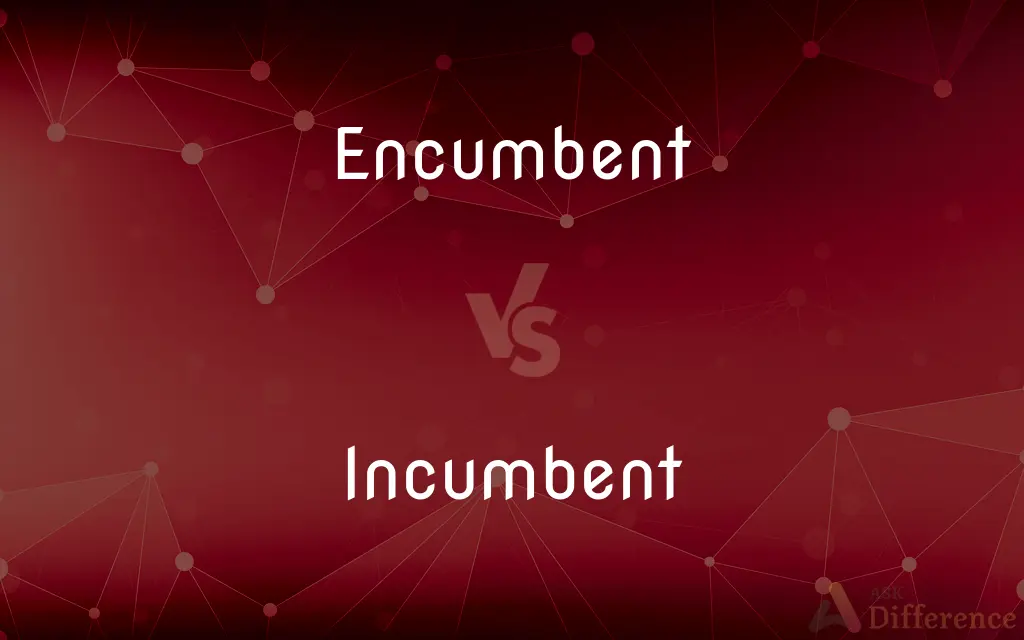Encumbent vs. Incumbent — Which is Correct Spelling?
Edited by Tayyaba Rehman — By Fiza Rafique — Updated on March 25, 2024
"Encumbent" is a misspelling. The correct term is "Incumbent," which typically refers to a person currently holding an office or position.

Table of Contents
Which is correct: Encumbent or Incumbent
How to spell Incumbent?

Encumbent
Incorrect Spelling

Incumbent
Correct Spelling
ADVERTISEMENT
Key Differences
Think of "in" as being currently "in" office.
"In-cum-bent" resembles "in-come-bent" – the bend towards retaining a position.
"In" indicates a current state, fitting for someone currently in a position.
"Encumbent" might sound like "encumber" but relates to officeholders.
Relate "Incumbent" to its use in politics.
ADVERTISEMENT
How Do You Spell Incumbent Correctly?
Incorrect: He is the encumbent mayor of the city.
Correct: He is the incumbent mayor of the city.
Incorrect: The encumbent senator has a lot of experience.
Correct: The incumbent senator has a lot of experience.
Incorrect: Many people expect the encumbent to win the election.
Correct: Many people expect the incumbent to win the election.
Incorrect: It's difficult for challengers to defeat an encumbent in elections.
Correct: It's difficult for challengers to defeat an incumbent in elections.
Incumbent Definitions
A person currently holding a particular office or position.
The incumbent mayor is seeking re-election.
Lying or resting on something else.
Clouds incumbent upon the mountaintop.
Necessary as a duty or responsibility.
It is incumbent on students to attend classes.
Imposed as an obligation or duty; obligatory
Felt it was incumbent on us all to help.
Lying, leaning, or resting on something else
Incumbent rock strata.
Currently holding a specified office
The incumbent mayor.
A person who holds an office or ecclesiastical benefice
The incumbent was reelected to another term.
(Used with "on" or "upon") Imposed on someone as an obligation, especially due to one's office.
Proper behavior is incumbent on all holders of positions of trust.
Lying; resting; reclining; recumbent.
Prevalent, prevailing, predominant.
Resting on something else; in botany, said of anthers when lying on the inner side of the filament, or of cotyledons when the radicle lies against the back of one of them
(zoology) Bent downwards so that the ends touch, or rest on, something else.
The incumbent toe of a bird
Being the current holder of an office or a title.
If the incumbent senator dies, he is replaced by a person appointed by the governor.
The current holder of an office, such as ecclesiastical benefice or an elected office.
(business) A holder of a position as supplier to a market or market segment that allows the holder to earn above-normal profits.
Lying; resting; reclining; recumbent; superimposed; superincumbent.
Two incumbent figures, gracefully leaning upon it.
To move the incumbent load they try.
Lying, resting, or imposed, as a duty or obligation; obligatory; always with on or upon.
All men, truly zealous, will perform those good works that are incumbent on all Christians.
Leaning or resting; - said of anthers when lying on the inner side of the filament, or of cotyledons when the radicle lies against the back of one of them.
Bent downwards so that the ends touch, or rest on, something else; as, the incumbent toe of a bird.
A person who is in present possession of a benefice or of any office.
The incumbent lieth at the mercy of his patron.
The official who holds an office
Lying or leaning on something else;
An incumbent geological formation
Currently holding an office;
The incumbent governor
Relating to or the responsibilities of an office or position.
It's incumbent upon us to make the right decision.
Existing or in use.
The incumbent software needs an update.
Incumbent Meaning in a Sentence
Voters often favor the incumbent due to their familiarity and experience.
The incumbent was criticized for not fulfilling all his campaign promises.
As the incumbent, he has the advantage of name recognition.
The election results showed strong support for the incumbent.
Incumbents usually have a better understanding of the political landscape.
The incumbent president announced her campaign for reelection.
Incumbent senators typically have a higher reelection rate than their peers in the House.
Being the incumbent gives him access to more campaign resources.
The debate between the challenger and the incumbent was highly anticipated.
In the primary election, the incumbent faced multiple challengers from within her party.
Despite the advantages, the incumbent must still work hard to secure reelection.
She defeated the incumbent in a surprising election upset.
Despite being the incumbent, he decided not to seek another term.
The incumbent mayor faced criticism over the city's budget deficit.
The incumbent governor has a strong base of support in rural areas.
Incumbent Idioms & Phrases
Incumbent upon
It is one's duty or responsibility.
It is incumbent upon the incumbent to address the city's pressing issues.
Unseat the incumbent
To defeat the current office holder in an election.
The challenger's campaign strategy focused on how to unseat the incumbent.
Challenge the incumbent
To contest against the current holder of an office in an election.
Three candidates have declared their intention to challenge the incumbent in the upcoming primary.
Sitting incumbent
Refers to someone currently holding an office.
The sitting incumbent has been in office for three terms.
Run against an incumbent
To campaign for an office held by someone else.
Running against an incumbent requires a well-planned strategy and clear message.
Defending incumbent
An office holder who is running for reelection.
The defending incumbent focused on highlighting his accomplishments.
Incumbent defeat
When a current office holder loses an election.
The incumbent defeat was seen as a sign of public desire for change.
Common Curiosities
Why is it called Incumbent?
The term originates from Latin "incumbere," meaning "to lay upon" or "to be incumbent upon," reflecting duties or obligations.
What is the pronunciation of Incumbent?
/ɪnˈkʌmbənt/.
Which vowel is used before Incumbent?
The vowel "e."
What is the verb form of Incumbent?
There isn't a widely accepted verb form of "Incumbent."
What is the root word of Incumbent?
Derived from the Latin "incumbere," meaning "to lay upon."
What is the plural form of Incumbent?
Incumbents.
What is the singular form of Incumbent?
Incumbent.
Which preposition is used with Incumbent?
"Upon" (as in, incumbent upon).
Which conjunction is used with Incumbent?
No specific conjunction is tied exclusively to "incumbent."
Is Incumbent a negative or positive word?
Neutral.
Is Incumbent a noun or adjective?
Both.
How many syllables are in Incumbent?
Three.
Is Incumbent an adverb?
No.
Is Incumbent a vowel or consonant?
"Incumbent" is a word, not a single letter.
What is a stressed syllable in Incumbent?
"cum."
What part of speech is Incumbent?
Noun and adjective.
Which article is used with Incumbent?
"The."
Is Incumbent a countable noun?
Yes.
What is another term for Incumbent?
Officeholder.
What is the opposite of Incumbent?
Challenger (in a political context).
What is the first form of Incumbent?
The word "Incumbent" doesn't have verb forms.
How is Incumbent used in a sentence?
"The incumbent senator has been in office for two terms."
Is Incumbent an abstract noun?
No.
Is the word “Incumbent” a Direct object or an Indirect object?
It can be either, depending on the sentence structure.
How do we divide Incumbent into syllables?
In-cum-bent.
Which determiner is used with Incumbent?
"The" (as in, the incumbent).
Is Incumbent a collective noun?
No.
Is the Incumbent term a metaphor?
No, but it can be used metaphorically in non-political contexts.
Is the word Incumbent imperative?
No.
Is the word Incumbent a gerund?
No.
Share Your Discovery

Previous Comparison
Lonley vs. Lonely
Next Comparison
Preffered vs. PreferredAuthor Spotlight
Written by
Fiza RafiqueFiza Rafique is a skilled content writer at AskDifference.com, where she meticulously refines and enhances written pieces. Drawing from her vast editorial expertise, Fiza ensures clarity, accuracy, and precision in every article. Passionate about language, she continually seeks to elevate the quality of content for readers worldwide.
Edited by
Tayyaba RehmanTayyaba Rehman is a distinguished writer, currently serving as a primary contributor to askdifference.com. As a researcher in semantics and etymology, Tayyaba's passion for the complexity of languages and their distinctions has found a perfect home on the platform. Tayyaba delves into the intricacies of language, distinguishing between commonly confused words and phrases, thereby providing clarity for readers worldwide.


































